The Health bulletin [serial] - University of North Carolina at Chapel Hill
The Health bulletin [serial] - University of North Carolina at Chapel Hill
The Health bulletin [serial] - University of North Carolina at Chapel Hill
Create successful ePaper yourself
Turn your PDF publications into a flip-book with our unique Google optimized e-Paper software.
10 <strong>The</strong> <strong>Health</strong> Bulletin April, 1927<br />
rotten products" In this particular instance,<br />
as in all others where such<br />
practices occur, the authorities would<br />
probably say with truth th<strong>at</strong> the personal<br />
habits in the priv<strong>at</strong>e life <strong>of</strong> their<br />
employees was a m<strong>at</strong>ter with which<br />
their employers had nothing to do. To a<br />
certain extent this is true, but in health<br />
habits, as well as in moral character<br />
and in certain m<strong>at</strong>ters <strong>of</strong> tinaucial responsibility,<br />
every health department<br />
should be above suspicion and require<br />
every one <strong>of</strong> its employees to <strong>at</strong> least<br />
measure up to the average intelligence<br />
expected <strong>of</strong> such people by the general<br />
public.<br />
PIGS AND PRODIGALS<br />
We are publishing below a letter from<br />
a trained nurse <strong>of</strong> extensive experience<br />
in which she discusses several<br />
pertinent questions either one <strong>of</strong> which<br />
would form the basis for a lengthy<br />
article. However we think the readers<br />
<strong>of</strong> the Bulletin will agree with us<br />
on the point she most accentu<strong>at</strong>es in<br />
her letter, and most likely to be remembered<br />
when the rest is forgotten,<br />
the reference to the fine food the pigs<br />
were getting when compared to the fare<br />
set before the family.<br />
On reading the letter the writer is<br />
reminded <strong>of</strong> an old gentleman who<br />
lived in Sampson about three miles<br />
from Clinton when the writer was a<br />
boy, too many years ago to confess<br />
without reluctance. This old gentleman<br />
had accumul<strong>at</strong>ed quite a lot <strong>of</strong> money<br />
and property and had achieved considerable<br />
<strong>of</strong> a reput<strong>at</strong>ion along many<br />
lines <strong>of</strong> activity. He inherited a farm<br />
<strong>of</strong> considerable size, but as the years<br />
moved on he added more and more land<br />
to his original holdings. He had no<br />
other source <strong>of</strong> income except wh<strong>at</strong> he<br />
made on his farm. He reared a large<br />
family, educ<strong>at</strong>ed them all, and <strong>at</strong> least<br />
two <strong>of</strong> his sons became widely known<br />
in <strong>North</strong> <strong>Carolina</strong> as capitalists before<br />
their de<strong>at</strong>h just a few years ago. This<br />
man produced everything on his farm<br />
th<strong>at</strong> could be raised in th<strong>at</strong> section. Before<br />
the railroad running to Clinton<br />
from Warsaw was built, about 1887, he<br />
hauled his early truck and produce<br />
across country to Warsaw and shipped<br />
to the northern markets, being a pioneer<br />
trucker and shipper. To this day, however,<br />
he is remembered on account <strong>of</strong><br />
one expression <strong>at</strong>tributed to him on<br />
more than one occasion. <strong>The</strong> expression<br />
was th<strong>at</strong> he raised his stuff to sell and<br />
when he carried it to town and failed<br />
to sell it he took it back home and<br />
<strong>of</strong>fered it to his hogs and if they refused<br />
to e<strong>at</strong> it, in order to save the food stuff,<br />
he <strong>at</strong>e it himself. Of course, the old<br />
man did not mean this literally, notwithstanding<br />
the country folks around<br />
about took it literally, and the oldtimers<br />
have all ever remembered it.<br />
<strong>The</strong> point we wish to make, however,<br />
is th<strong>at</strong> in th<strong>at</strong> section, <strong>at</strong> a period when<br />
the chief occup<strong>at</strong>ion <strong>of</strong> most farm people<br />
was producing tar, pitch, and turpentine<br />
to be flo<strong>at</strong>ed down the river and<br />
sold <strong>at</strong> Wilmington and the year's produce<br />
in white flour and molasses and<br />
white western bacon shipped from the<br />
Middlewest to New York and from<br />
there by ocean freight to Wilmington<br />
was purchased for the supplies for tenants<br />
in exchange for the tar, pitch,<br />
and turpentine, this old man made a<br />
business <strong>of</strong> raising a variety <strong>of</strong> truck<br />
and vegetables, hogs and cows and<br />
poultry, and got rich doing it.<br />
He gave<br />
all his children a fine start in life, all<br />
with a basis <strong>of</strong> sound health.<br />
He himself<br />
had good health, and died in his<br />
sleep <strong>at</strong> eighty years old.<br />
Please read this trained nurse's letter<br />
and compare her observ<strong>at</strong>ions with your<br />
own experience.<br />
"I wish you would write something<br />
about the fallacy <strong>of</strong> fumig<strong>at</strong>ion and the<br />
eflicacy <strong>of</strong> soap and w<strong>at</strong>er and sunshine<br />
and fresh air. Also whole whe<strong>at</strong> and<br />
Graham flour versus white flour.<br />
"I heard Dr. Linney <strong>of</strong> Charlotte say<br />
two weeks before he died th<strong>at</strong> it ought<br />
to be against the law to make and sell<br />
white flour. He was <strong>at</strong>tending Dr.<br />
Crowson's funeral and stopped where I<br />
lived in Taylorsville. He was a specialist<br />
for rectal trouble. He was very much<br />
overweight and died from apoplexy.<br />
Everything one reads about diet for<br />
children and everybody else says to e<strong>at</strong><br />
whole whe<strong>at</strong> or Graham, but very few<br />
do it especially the ones who can very<br />
easily get it, the ones who make it on<br />
the farm. <strong>The</strong> place I lived in one


![The Health bulletin [serial] - University of North Carolina at Chapel Hill](https://img.yumpu.com/33495252/112/500x640/the-health-bulletin-serial-university-of-north-carolina-at-chapel-hill.jpg)
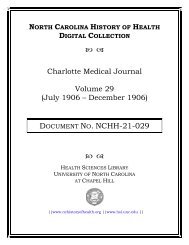
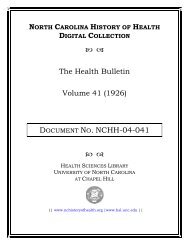
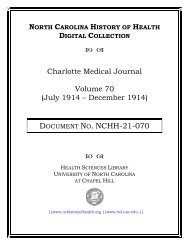
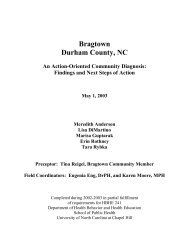
![Bulletin of the North Carolina Board of Health [serial] - University of ...](https://img.yumpu.com/48032016/1/153x260/bulletin-of-the-north-carolina-board-of-health-serial-university-of-.jpg?quality=85)
![The Health bulletin [serial] - University of North Carolina at Chapel Hill](https://img.yumpu.com/47603625/1/169x260/the-health-bulletin-serial-university-of-north-carolina-at-chapel-hill.jpg?quality=85)
![The Health bulletin [serial] - University of North Carolina at Chapel Hill](https://img.yumpu.com/47242858/1/169x260/the-health-bulletin-serial-university-of-north-carolina-at-chapel-hill.jpg?quality=85)
![The Health bulletin [serial] - University of North Carolina at Chapel Hill](https://img.yumpu.com/43204263/1/172x260/the-health-bulletin-serial-university-of-north-carolina-at-chapel-hill.jpg?quality=85)
![The Health bulletin [serial] - University of North Carolina at Chapel Hill](https://img.yumpu.com/41981074/1/163x260/the-health-bulletin-serial-university-of-north-carolina-at-chapel-hill.jpg?quality=85)
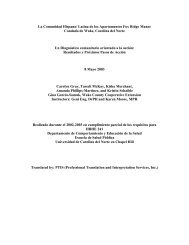
![The Health bulletin [serial] - University of North Carolina at Chapel Hill](https://img.yumpu.com/40912928/1/164x260/the-health-bulletin-serial-university-of-north-carolina-at-chapel-hill.jpg?quality=85)
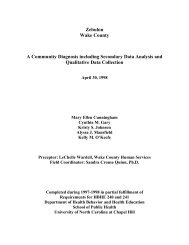
![The Health bulletin [serial] - University of North Carolina at Chapel Hill](https://img.yumpu.com/35643061/1/167x260/the-health-bulletin-serial-university-of-north-carolina-at-chapel-hill.jpg?quality=85)
![Biennial report of the North Carolina State Board of Health [serial]](https://img.yumpu.com/34024350/1/166x260/biennial-report-of-the-north-carolina-state-board-of-health-serial.jpg?quality=85)
